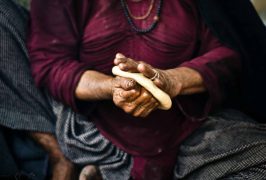November 23, 2015, Toronto – On November 24, 2015, the Women’s Legal Education and Action Fund (LEAF) and the Institute for the Advancement of Aboriginal Women (IAAW) will argue a motion for leave to intervene in R. v. Barton at the Alberta Court of Appeal. This is the appeal of the verdict in the Cindy Gladue case. At the trial, the jury accepted the defence argument that Ms. Gladue, an Indigenous woman, had consented to “rough sex” and acquitted the man accused of her murder, Bradley Barton. Ms. Gladue bled to death as a result of a wound inflicted upon her by Mr. Barton.
“The Cindy Gladue case raises critical issues of the law of consent, the treatment of Indigenous women by the criminal justice system and the issue of violence against women in general,” notes LEAF Legal Director Dr. Kim Stanton.
Sexual violence is a form of sexual inequality that is often exacerbated by prohibited grounds of discrimination such as race, class, and gender, and the legal system can be seen to maintain and perpetuate such inequalities. LEAF and IAAW are committed to promoting the rights of Indigenous women to be free from violence and discrimination based on race, class, and gender. LEAF and IAAW assert that the court’s interpretation of consent in this case will particularly affect Indigenous women who are engaged in sex work.
“Numerous commissions and hearings highlight how legal systems ignore or respond in derogatory ways towards violence against Indigenous women”, states IAAW President Muriel Stanley Venne. “The significance of this case cannot be underestimated. If the verdict stands it will provide a precedent detrimental to all women, as it would reinforce the degradation of, and lack of respect for, women’s bodies.”
LEAF will seek to provide the court with its expertise regarding the problematic formulation of the law of consent by the judge and question the use of Ms. Gladue’s sexual history in the trial. This expertise has been developed during thirty years of protecting and promoting the rights of sexual assault complainants in case after case before the Supreme Court of Canada.
For the past twenty years, IAAW has advanced the rights of Indigenous women through advocacy, education, research and program development. IAAW will seek to provide the court with its extensive knowledge and lived experience regarding systemic discrimination against Indigenous women and Indigenous people in Alberta.
LEAF and IAAW are proud to be represented in this leave motion by Ritu Khullar, Kristan McLeod and Vanessa Cosco of Chivers Carpenter, and Lisa Weber of Weber Law Group. For more information about our proposed intervention, please see our leave application.
About Women’s Legal Education and Action Fund (LEAF)
Since April 17, 1985, when equality rights were enshrined in sections 15 and 28 of the Charter of Rights and Freedoms, LEAF has worked toward equality for women and girls. LEAF intervenes in key cases to ensure that when courts interpret equality rights, there will be a systemic improvement in women’s lives. For more information about LEAF, visit leaf.ca
About the Institute for the Advancement of Aboriginal Woman (IAAW)
For the past 20 years, IAAW has advanced the rights of Aboriginal women through advocacy, education, research and program development. IAAW is composed of First Nation and Metis Women dedicated to supporting other women in their journey to build individual and family capacity while supporting the development of healthy, safe and caring communities. For more information about IAAW, visit iaaw.ca
For media inquiries:
Kim Stanton, LEAF, Legal Director
416.595.7170 x 223, [email protected]
Muriel Stanley Venne, IAAW, President
780.887.3115, [email protected], [email protected]
Case Update
On November 24, 2015, counsel for the Women’s Legal Education and Action Fund (LEAF) and the Institute for the Advancement of Aboriginal Women (IAAW) appeared with respect to our motion for leave to intervene in R. v. Barton at the Alberta Court of Appeal. Unfortunately, Bradley Barton has not retained counsel for the appeal, and the matter was adjourned until January 2016.
